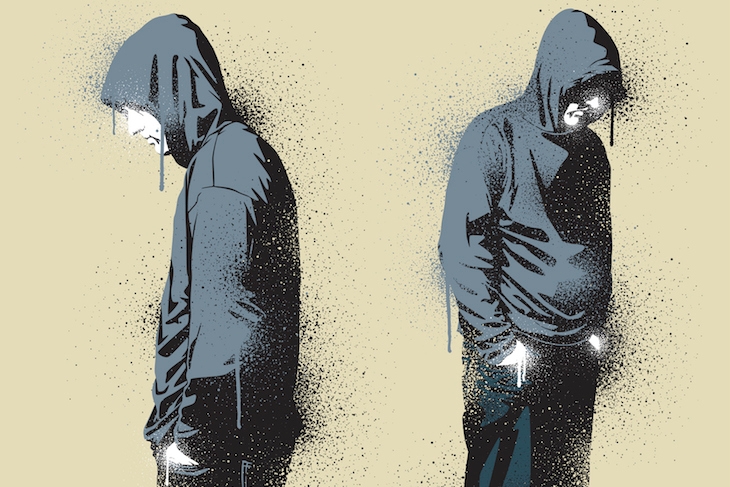Spring has come to my local park in its usual way. First the magnolias, then the cherry blossom, then the little silver ampules which once held nitrous oxide scattered in the grass. On Sunday the kids appeared, not a gang exactly, more a swarm of teens, angry and unstable.
A boy of about 14 raced a moped at breakneck speed around the toddler playground. ‘Can you stop?’ said a brave father. ‘You might run over a child.’
‘Fuck you,’ said the boy. ‘And I’ll fuck your mother too.’
On the way home, another spring staple: a police helicopter hovering over the Essex Road and below it the remnants of a raid: five vans, six cars, 30-odd coppers in body armour and two BBC cameramen just packing up. Once I might have made fun of them. Do you really need the BBC to make an arrest? But after four years in London N1, an odd new feeling has crept up on me: sympathy for the police.
If you lurk about on the Essex Road, you can see their daily grind in action: the angry drunks; the volatile drug-running teens. I’ve seen the gang boys’ weapons of choice evolve in a comically awful way: first kitchen knives, then machetes, then zombie killer blades. Samurai swords were fashionable for a while.
Not so long ago society policed itself a little. Britain’s tutters and shushers, the guardians aunts of civilisation, gave disrespectful teens what for. Not anymore. Who wants a knifing? So we leave the kids to the police.
That’s not why I feel sorry for them. It’s their job, and I suppose this is what a young cop is prepared for. But what does seem to me unfair is that the men and women on this grisly frontline are so routinely undermined by the politicians who should support them. They’re called racist by our Prime Minister, who insists that officers stopped and searched black boys disproportionately — though as her former speechwriter Alasdair Palmer revealed in this mag, she’d been shown evidence to the contrary. Then there’s the Home Secretary who’s loath to admit we even have a knife-crime problem.
Three people were stabbed in other parts of London last Sunday evening as the helicopter hovered over N1. On Monday an 18-year-old died of a knife wound in Forest Gate. As I write, Twitter is reporting two more stabbed in Kingston. Yet Amber Rudd’s explanation is not that gangs are out of control, but simply that the police are now gathering better data and reporting more crimes. Nothing to see here, she says, crime is still falling, so no more bobbies are needed on the beat — though a Home Office document has been leaked suggesting she knows very well that police cuts are a problem.
Bill Bratton, the ‘supercop’ who turned the tide of violence in New York, has been holding forth about what he thinks our Met should do. London’s sick, he says. It needs the same medicine he gave NY in the 1990s. Bratton presided over not cuts but a huge training and recruitment drive and the acquisition of equipment worth hundreds of millions of dollars. ‘You get what you pay for,’ says Bratton. Quite.
Late last year the Police Federation, which represents rank-and-file officers, said its members were becoming increasingly stressed. Morale is low, cops feel undervalued and record numbers plan to quit. Well of course they do. It’s one thing to do a tough job and be congratulated as a hero; it’s quite another to keep cracking on when your political masters denounce you in public.
In the Evening Standard, Wayne, an ex-gangster from Plumstead, gave an interview in which he explained that the resettled kids from war zones had upped the ante in gangland. ‘In the last ten years, since the Somalis and the Congolese came to London, they taught us a whole new level of violence. These people had seen family members mutilated, so when they said, “I’m gonna smash you up”, us guys would be shouting, “Yo blud, wot you mean?” and they would just pull out a blade and juk [stab] you in the chest. It upped the speed and level for us British-born guys. We had to arm up to protect ourselves. It created an upward spiral.’
Not Amber Rudd, not Sadiq Khan nor Theresa May would ever speak publicly about this, for fear of seeming racist. But isn’t that in itself racist? It implies that the problem is somehow to do with skin colour, when any poor kid forced into a civil war might well be brutalised by it. We absolutely have a duty to offer asylum to children fleeing horrific circumstances, but we also have a duty to acknowledge the increased dangers the police face as a result. If we don’t, these multiply.
In 2015, during her tenure as Home Secretary, Theresa May thought it a nice idea to recommend that the cops stop chasing kids without helmets on mopeds for fear they’d crash and injure themselves. The result of this kindly meant, politically expedient guidance was a huge increase in both moped-stealing and moped-backed crime. By 2017, gang kids were cruising around town swiping phones from passing pedestrians. They drove into cafés and snatched laptops from coffee-drinkers, then zoomed away. The guidance has been reversed but the die is cast. It’s contributed to a culture in which almost everyone thinks it’s a grand idea to mock the police.
Last summer I was standing outside a pub on the Canonbury Road when the sounds of a chase filled the air: the unmistakable high-pitched revs of a moped and police sirens behind it. The bike raced up the road past us, two of the usual kids on board, both with face masks. The group of young men drinking on the pavement beside me began to shout: ‘Take off your helmets, take them off, then the cops can’t chase you!’
Theresa May’s obvious disdain for the police had become a national hobby.







Comments